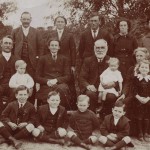Here is study 6 of the series “small studies” in Genesis
Gen_1:11 ”And God said, Let the earth bring forth grass, the herb yielding seed, and the fruit tree yielding fruit after his kind, whose seed is in itself, upon the earth: and it was so.”
Study 6 – Grass, and all things “after his kind.”
“And the earth brought forth grass, and herb yielding seed, after his kind, and the tree yielding fruit, whose seed was in itself, after his kind (Gen 1:12). And the evening and the morning were the third day” (Gen 1:13).
———————————————————
In God’s creation, each and every individual piece of grass casts a small shadow and as we have discovered previously, there can be no shadow without there being a substance to cast that shadow. So what do you think the substance of “the grass” would be?
Well, if the waters that John saw in Rev 17:15 were “peoples, and multitudes, and nations, and tongues” (in other words, large groupings of people) then an individual piece of grass must represent one single individual from within those larger groupings of families and nations. So “grass” is the shadow representation of individuals from within those larger groupings of families and nations.
“My doctrine,” says Deut 32:2, “shall drop as the rain, my speech shall distill as the dew, as the small rain upon the tender herb, and as the showers upon the grass.” Here Moses gives a beautiful picture of men and women who are like “the grass,” receiving God’s “doctrine” or the “water of life” as it is described in Rev 22:1, which “distills as dew.” God sends his word to us like “dew” from heaven so we can drink it in and absorb and understand it as it gently falls upon us from heaven.
“And he shall be as the light of the morning, when the sun rises, even a morning without clouds; as tender grass springing out of the earth by clear shining after rain.” This is a picture of a time yet in the future, when the grass will be “tender” because this “grass” or individuals who have been faithful are one day going to be made immortal and they they will never “wither” nor will their “flower fade.”
The picture given to us of “the grass” in its present state, however, is not not so beautiful. “Therefore their inhabitants were of small power, they were dismayed and confounded: they were as the grass of the field, and as the green herb, as the grass on the housetops, and as corn blasted before it be grown up.” (2 Ki 19:26).
“For they shall soon be cut down like the grass,and wither as the green herb” (Psa 37:2). One day in the not too far distant future, the “wicked” who presently “spring as the grass” and those “workers of iniquity” flourish: it is that they shall be destroyed for ever” says the Psalmist (Psa 92:7).
“As for man, his days are as grass: as a flower of the field, so he flourisheth” (Psa 103:15). “All flesh is grass, and all the goodliness thereof is as the flower of the field, the grass withereth, the flower fadeth: because the spirit of the Lord bloweth upon it; surely the people is grass” (Isa 40:6-7).
All those individual pieces of grass who are the individuals of the nations of the world, good or evil, will at best live out their three-score years and ten in peace, but their end will be the same. All their beauty will “wither and their flower fade for the sun is no sooner risen with a burning heat, but it withereth the grass, and the flower thereof falleth, and the grace of the fashion of it perishes: so also shall the rich man fade away in his ways” (Jas 1:11). “For all flesh is as grass, and all the glory of man as the flower of grass. The grass withers and the flower thereof falls away.”
In contrast to the transient nature of “the grass” of mankind, we are assured by God that “the word of our God shall stand forever” (Isa 40:8). In God’s mercy, the bleak picture of man’s insignificance within God’s creation does not have to be accepted by those faithful individuals amongst the “grass” of the nations.
Because God is so very merciful, he offers mankind hope.
“Wherefore, if God so clothe the grass of the field, which today is, and tomorrow is cast into the oven, shall he not much more clothe you, O ye of little faith?” (Matt 6:30). God promises that although he will “sift the house of Israel among all nations, like as corn is sifted in a sieve, yet shall not the least grain fall upon the earth (Amos 9:9).
Of course, that will be no comfort to the “tares” or the enlightened but unfaithful people who are spoken of in Jesus’ parable of the “wheat and the tares.” These “tares” are those “unwise” virgins, who wake to find that they have “no oil in their lamps.” These are the “tares” who will be found alongside of the “good grain,” or the “wise virgins,” who were indistinguishable from them, before that day of harvest, but whose true nature will then be exposed. “Let both grow together” said Jesus “until the harvest: and in the time of the harvest I will say to the reapers, Gather ye together first the tares, and bind them in bundles to burn them: but gather the wheat into my barn” (Matt 13:30).
When his disciples asked Jesus the meaning of this parable, he said, ”The field is the world; the good seed are the children of the kingdom; but the tares are the children of the wicked one. As therefore the tares are gathered and burned in the fire; so shall it be in the end of this world” (Matt 13:40).
And so we follow the history of “the grass” through the pages of the Word of God, to a time in the future when the first angel sounded “there followed hail and fire mingled with blood, and they were cast upon the earth: and the third part of trees was burnt up, and all green grass was burnt up” (Rev 8:7).
And it was commanded them them that they should not hurt the grass of the earth, neither any green thing, neither any tree; but only those men which have not “the seal of God in their foreheads” (Rev 9:4). So not all the “grass,” not all the people will be destroyed in the judgment of the last days.
There will always be a remnant who will be saved, those who DO “have the seal of God in their foreheads” (Rev 9:4), those wise virgins who DID have oil in their lamps when the bridegroom came. This “grain,” this “grass,” Jesus will “gather together” at his coming, and store them in his “garner” (Matt 3:12).
By Fay Berry 2018.








